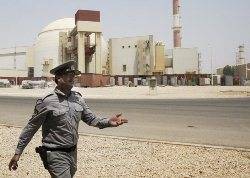Six world powers have accepted an Iranian offer for talks on its disputed nuclear program.
Catherine Ashton, the European Union's foreign policy chief, on Tuesday sent an offer to Iran proposing renewed diplomatic talks between the five permanent members of the UN Security Council (UNSC) plus Germany.
"On behalf of China, France, Germany, the Russian Federation, the United Kingdom, the United States of America, I have offered to resume talks with Iran on the nuclear issue," she said in a statement.
Tuesday's announcement by the EU's top diplomat came shortly after Russian calls for a resumption of face-to-face dialogue as soon as possible.
A letter on February 14 demonstrated that Iran was now ready for serious negotiations, according to Russia.
Ashton said the offer had been made to Iran in response to correspondence sent by Saeed Jalili, Iran's top nuclear negotiator.
"Our overall goal remains a comprehensive negotiated, long-term solution which restores international confidence in the exclusively peaceful nature of Iran's nuclear program, while respecting Iran's right to the peaceful use of nuclear energy," Ashton said in her reply to Jalili.
A time and venue now needed to be agreed, she said.
The last round of negotiations between the six nations and Iran ended in failure in January 2011.
William Hague, the UK foreign secretary, said in a statement that the burden would "be on Iran to convince the international community that its nuclear program is exclusively peaceful".
Access granted
In a separate development, Iran has agreed to grant access to the inspectors of the International Atomic Energy Agency (IAEA) to visit the Parchin compound.
The long-sought access to what Iran calls a military base, not a nuclear facility, came a day after the head of the UN nuclear watchdog, Yukiya Amano, said his organization had "serious concerns" that Iran may be hiding secret atomic-weapons work.
He singled out the Parchin military complex southeast of Tehran.
The semi-official ISNA news agency quoted the Iranian statement as saying: "Given that Parchin is a military site, access to this facility is a time-consuming process, and it can't be visited repeatedly."
It said that following repeated IAEA demands, “permission will be granted for access once more".
Israel, which says its existence could be threatened if Iran is allowed to develop nuclear weapons, is losing confidence in Western efforts to change Iran's policy with sanctions and diplomatic pressure.
Binyamin Netanyahu, the Israeli prime minister, told US President Barack Obama on Monday that Israel had made no decision on attacking Iranian nuclear sites, sources close to talks in Washington said.
Netanyahu, however, gave no sign of backing away from the option of military attacks.
Speaking at the ongoing American Israel Public Affairs Committee (AIPAC) conference in Washington on Tuesday, Leon Panetta, the US defense secretary, said "military action is the last alternative when all else fails" in Iran.
"But make no mistake, we will act if we have to," he said.
PHOTO CAPTION
An Iranian security directs media at the Bushehr nuclear power plant, with the reactor building seen in the background, just outside the southern city of Bushehr, Iran, Aug. 21, 2010.
Al-Jazeera


 Home
Home Discover Islam
Discover Islam Quran Recitations
Quran Recitations Lectures
Lectures
 Fatwa
Fatwa Articles
Articles Fiqh
Fiqh E-Books
E-Books Boys & Girls
Boys & Girls  Hajj Rulings
Hajj Rulings Hajj Fatwas
Hajj Fatwas














